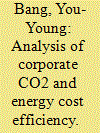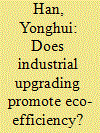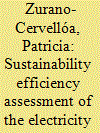| Srl | Item |
| 1 |
ID:
168661


|
|
|
|
|
| Summary/Abstract |
Corporate eco-efficiency should be managed to take environmental responsibility for climate change mitigation. However, firms have difficulty determining what eco-efficiency metric is appropriate, what key performance indicators are to be managed, and what characteristics of environmental reporting are effective for environmental management. Thus, this study develops and measures a corporate CO2 and energy cost efficiency; and analyzes the key performance indicators and industrial characteristics for this cost efficiency and the key characteristics of environmental reporting to effectively enhance the cost efficiency. The cost efficiencies of 119 firms are measured by using a data envelopment analysis (DEA). A statistical Tobit regression analysis is used to analyze the key performance indicators and the characteristics of effective environmental reportings. The cost efficiencies of the firms are overall low and affected by industrial characteristics, i.e., assembly- or process-based manufacturing. The key performance indicators are significantly related with administration cost and energy intensities. The effective environmental reportings have a common characteristic that requires qualitative real evidences for environmental improvement, as well as quantitative environmental performances. This study provides valuable information for corporate environmental management and policy to effectively enhance the eco-efficiency of firms.
|
|
|
|
|
|
|
|
|
|
|
|
|
|
|
|
| 2 |
ID:
180111


|
|
|
|
|
| Summary/Abstract |
Industrial upgrading plays a significant role in promoting eco-efficiency, but existing studies ignore this aspect. Using improved and comprehensive measures of eco-efficiency, we assess how industrial upgrading influences the eco-efficiency of a certain province with provincial panel data during the period 1998–2017. We find that industrial upgrading significantly promotes eco-efficiency and yields significantly positive spatial spillover effects. Our findings provide empirical evidence that the government should push forward industrial upgrading decisively, as well as strengthening inter-regional and central-provincial collaboration in promoting eco-efficiency.
|
|
|
|
|
|
|
|
|
|
|
|
|
|
|
|
| 3 |
ID:
169738


|
|
|
|
|
| Summary/Abstract |
Assessing the sustainability level of the power sector can aid the transition towards a sustainable energy system. In this contribution, we propose a novel approach to compare and optimize electricity mixes according to sustainability criteria and apply it to the 28 EU members. Our method combines life cycle assessment, data envelopment analysis (DEA) and rigorous mathematical programming tools in three main steps. Firstly, DEA is applied to assess the efficiency level of electricity mixes of EU member countries considering the three dimensions of sustainability. Then, electricity portfolios of inefficient countries are optimized by solving a model that seeks to attain the targets provided by DEA while simultaneously considering the technical aspects governing electricity generation. This model, which constitutes the cornerstone of our approach, complements standard DEA by ensuring realistic and meaningful targets. In the third step, we evaluate the electricity portfolios optimized previously by running DEA again. Our results suggest that energy policies in the EU should favor the deployment of hydropower, wind and solar, while simultaneously displacing non-renewable sources and bioenergy. The deployment of carbon capture and storage is also a potential alternative that could be incentivized via policies worded in terms of carbon intensity targets.
|
|
|
|
|
|
|
|
|
|
|
|
|
|
|
|